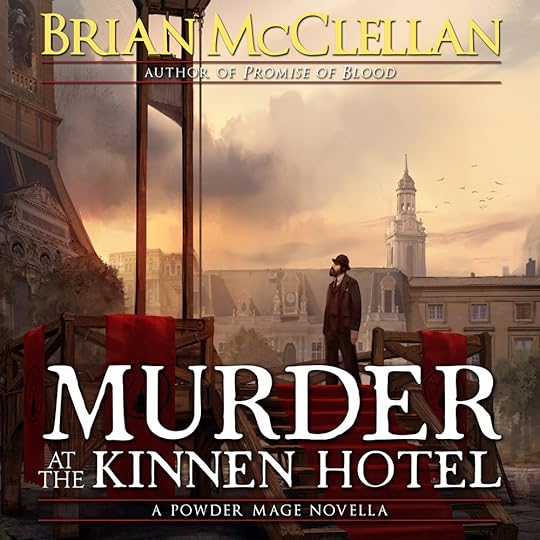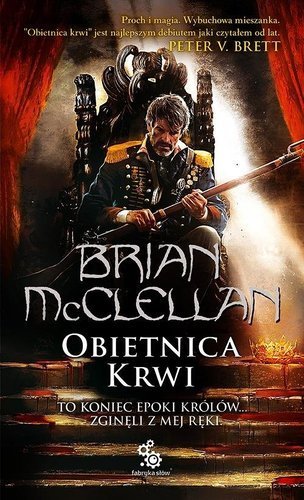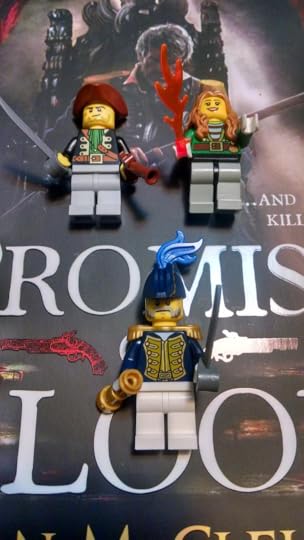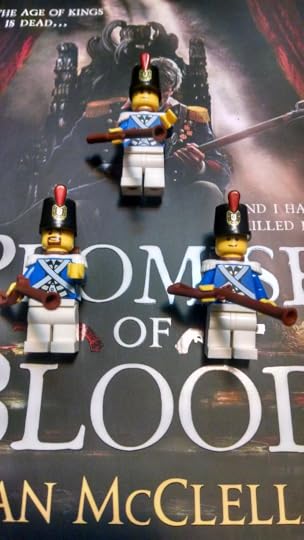Brian McClellan's Blog, page 29
July 17, 2015
Brian at Gen Con!
Two weeks from now, Gen Con in Indianapolis is going to be in full swing, and I'm going to be there for the Gen Con Writer's Symposium. I'll be hanging out talking to fans, attending panels, signing books, and will have books for sale at the Indy Reads Bookstore in the Exhibit Hall. You can check out the full Writer's Symposium schedule here, and find my specific schedule below:
Thursday, July 30th, 11AM: Book Signing in Author's Avenue in Exhibit Hall.
Thursday July 30th, 2PM: Defining Genres and Why it Matters room 244
Thursday July 30th, 3PM: Writing Action Scenes room 245
Friday July 31st, 11AM: Writing Dialogue and Dialogue Tags room 244
Friday July 31st, 12PM: Plot Design room 244
Friday July 31st, 2PM: Book Signing in Author's Avenue in Exhibit Hall.
Saturday August 1st, 12PM: Heroic Pairs room 245
Saturday August 1st, 2PM: Book Signing in Author's Avenue in Exhibit Hall.
June 30, 2015
Book Formats and You
This is the sixth of my essays about being an author, brought to you by my Patreon page.
When an author first sells their books, one of the things outlined in their contract is format rights as well as the royalties that they'll make on said formats. Now, we talked about those different royalties in a previous essay, discussing how much money an author can expect to make off of each individual book they sell depending on if it's a physical copy, audiobook, or ebook. What we did not talk about is how many of each of those formats you can expect to sell.
I'm not talking about the number of books sold, obviously, because no one has any idea how many will sell; not you, your agent, the bookstores, or even your publisher. What I'm talking about is the percentage of overall sales that will wind up coming from each of the formats published. This may seem like a trivial topic, but as we outlined in that previous essay authors make vastly different amounts of money off the sale of a mass market versus, say, an audiobook or hardcover.
To keep things simple, I'm going to ignore stuff like C-format, foreign copies, or library copies and focus on the big ones: hardcover, ebook, audiobook, mass market, and trade paperback. This is where it starts to get complicated so pay attention, because all of this is going to make your head hurt a little bit.
As I alluded before, different contracts may include different rights being sold at different times, perhaps even to different companies. This is mostly divided between physical books and ebooks being sold together, with audiobooks maybe or maybe not getting picked up at the same time (it used to be divided even further, because ebooks used to not be a thing and when they first were, some publishers didn't bother with them, but I don't think that happens much any more). In addition, publishers don't put out every book in all three physical formats. My books, for instance, came out in hardcover and trade paperback in the US and hardcover and mass market in the UK. Many of my author friends are out in trade paperback and mass market without hardcover, or mass market alone.
This means that getting any real solid data on this kind of thing when you don't have access to the databases of a publisher is really difficult. When I decided to do this essay I sent emails off to a handful of my author friends asking if they'd be willing to share their format percentages. The first thing I learned is that most authors don't keep track of these numbers with the same obsessive zeal that I do. For some, looking at number sales causes anxiety, for others, they're just not interested.
The second thing I learned was, as mentioned above, I'm not going to be able to give you a solid spread of consistent formats. Let's get into the numbers so I can show you what I mean. First we'll look at some of my friends who were able to give me sales percentage data:
Wesley Chu's Lives of Tao sold 40% ebook, 60% mass market. No info on audio.
Myke Cole's Control Point sold 49% ebook, 51% mass market. No info on audio.
Stephen Blackmoore's Dead Things sold 53% ebook, 47% mass market. Audio sold separately and will be out later this year.
Jason Hough's Darwin Elevator sold 70% ebook, 20% mass market, and 10% audio.
I like this data because it's all from book one in a new series with different audiences that may overlap a bit, and all concerning the same formats. Just from these four, you can see a 30% spread on format sales—wowza. However, this data also makes it look like it'll be simple to analyze this kind of stuff over multiple authors. To disabuse you of this notion, let's take a look at a few more:
Django Wexler's Thousand Names sold 62% ebooks, 38% hardcover/mass market, and no data on audio.
Django's middle grade (8-12 years) Forbidden Library sold 93% hardcover and 7% ebook in the UK.
Michael Sullivan's Theft of Swords sold 45% ebooks, 26% trade paperback, and 29% audiobooks.
Mark Lawrence's Prince of Thorns sold 55% ebooks, 45% everything else.
Missing data! Different formats! Murky reports! Various audiences! This way surely lies madness. Mark commented that his ebook percentage has climbed across all five of his books ending with 78% of sales for his latest, while Myke said his was steady across the three books and then the mass market leapt up for the fourth. Even trying to figure out how sales will go within a single series seems anyone's guess.
Okay, so I've offered up a bunch of other people's numbers. To further illustrate that point about a series, here are some of my own:
US hardcovers: 10.31%US ebooks: 63.21%US audio: 13.31%US trade paperback 13.17%US hardcovers: 20.59%US ebooks: 55.92%US audio: 15.15%US trade paperback 8.33%US hardcovers: 18.53%US ebooks: 62.76%US audio: 18.71%You can easily see the first problem with looking at this data even across my own series: the trade paperback of each book came out eight months or so after the other formats, so the data is skewed against that format and in the case of Autumn Republic, it isn't even out yet. It would be far more accurate to look back at this in, say, five years.
(One interesting thing to note is that the system is built that way so that people who buy the trade of an earlier book will hopefully buy hardcover of the newest release. The big jump in hardback percentage from books one to two reflect this. I only have about half the sales data for hardcovers of Autumn Republic, so I suspect you'll see another large jump there once I do get that data.)
If you compare my data with the data from my author friends above, you can see the problem. The differing formats means that we're comparing apples to something vaguely but not entirely apple-like. If you decide to get fancy and throw in other rights, even just the World English ones, things get even more crazy.
Let's toss another set of numbers in there for fun: John Scalzi publicly posted the numbers for his book Redshirts about seven months after it came out. They were 45% ebook, 34% hardcover, and 21% audio.
Because I keep obsessive spreadsheets on these things I was able to go back and check and see what the US numbers for Promise of Blood were after seven months. They were 68% ebook, 24% hardcover, and 8% audio. You can see the significant difference between Scalzi's numbers and my own. The problem with trying to interpret the reason for those differences is it's all conjecture: it was not his first book, so he had more people buying hardcover; for part of that time my ebook was on sale for $1.99; his audiobook had been pushed hard by Audible; etc. It's going to be a combination of all of the above, of course, but how much of each.
The conclusion I come to, presented with all this data, is that there's no "rule of thumb" that can cover all of publishing. Keep in mind, most of the numbers I gave you above are from genre authors writing to an adult crowd. Numbers change dramatically across YA, middle grade, romance, westerns, etc. I'm not saying it's hopeless. If a new author were to ask me what they can expect, I'd probably tell them they'd sell around 50% in ebooks—and I might be close. But some authors gather giant followings among audiobook listeners or hardback collectors that skew the numbers.
I don't really envy the people who have to sort through this mess for a living, even if I do find it fascinating.
June 7, 2015
June Sale + Book Update
Hey guys! Been awfully busy around the McClellan house lately, what with Phoenix Comicon and trying to get book one of the new trilogy finished. I'm just popping in now to let you know I have a special sale on the website bookstore. With the code JUNESALE you can get 15% off all orders until Thursday night, June 11th. In addition, everyone who orders until the end of the sale will be emailed an Audible code for the audiobook of Murder at the Kinnen Hotel, which is normally $6.95 on Audible.
I've been getting a lot of questions about the next book lately, so here's a quick check-in: I'm working on the first book in a sequel trilogy that takes place ten years after the end of The Autumn Republic. It does not have a title yet. I should have it done in the next couple months, and you can expect it out sometime next year. I'll let you guys know as soon as I have a firm release date!

May 24, 2015
Phoenix Comicon Schedule
This coming week (May 27th-31st), I'll be at Phoenix Comicon where you can find me signing books, speaking on panels, eating cake, and hanging out with friends and fans. It's shaping up to be a rousing good time. If you're in the Phoenix area but not attending Comicon, don't worry! I'll be at an offsite signing with a whole gaggle of awesome authors! Here's my panel schedule for the week. Click on the links to get panelist information and locations.
Poisoned Pen Signing Extravaganza: Wednesday, 7:00pm - 8:00pm at the Poisoned Pen in Scottsdale, AZ. I'll be available to sign books you bring and the store will have books for sale. Click on the link to check out the list of other authors present. There will be drinks, snacks, and giveaway prizes.
Magic Refresh: Thursday, 7:30pm - 8:30pm. Why does magic seem to withstand the test of time? Panelists discuss the use of magic and how innovative ideas bring fresh new ways to use magic in literature.
How Big Can It Get: Friday 3:00 - 4:00pm. They don't call it "epic" fantasy for nothin'. Share the glories and tragedies of writing big in epic fantasy: building massive worlds, creating huge casts of characters, and thinking the biggest ideas. Go big or go home (Don't go home, please come).
The Food of Fantasy: Friday 4:30pm - 5:30pm. Feast scenes are a staple of any fantasy author's diet, just as much as dragons and talking swords. But is there more to a feast scene than just disturbingly elaborate portrayals of roast duck? Digest this issue with our panelists!
Author Signing: Brian McClellan,Sam Sykes,Mur Lafferty,Max Gladstone,Margaret Dunlap : Friday 6:00pm - 7:00pm
Author Signing: Scott Sigler,Jason Hough,Brian Staveley,Brian McClellan,Django Wexler : Saturday 3:00pm - 4:00pm
Keep the Sorcery Lose the Sword: Saturday 6:00pm - 7:00pm. Panel of authors who write fantasy set in the Gun Powder era.
Signing:Beth Cato,Brian McClellan,Joseph Nassise,Peter V. Brett,Richard Kadrey,Viola Carr : Sunday 1:30pm - 2:30pm. Warning: I may not be able to make this one, as my flight out leaves at 4pm.
May 19, 2015
How an Author Gets Paid: The Big Picture
This is the fifth of my essays about being an author, brought to you by my Patreon page.
Last month I wrote an essay about how much money (depending on the format) a traditionally-published author makes off individual sales of their books, which you can check out here. I had several people ask me about the how and when of the money actually reaching the author and that, my friends, is a whole other thing.
When an author gets into a contract with a publisher, they are usually signing away the rights of publication in return for a set amount of the profits, or royalties, from the sales of the books. These royalties are the numbers I covered in that last essay but it's important to note that while yes, this is the amount of money the author makes off of those individual sales, it's not going to them directly. It has a bit of a path to take.
First off, authors don't just sell the publication rights for the royalties alone, otherwise I suspect royalties would be a bit higher than they are. They also sell them for something called an advance. The advance is a chunk of money, payable upon certain parameters, that the author gets for their rights. It basically constitutes a promise from the publisher that they're investing in you, the author, and they won't walk away from the contract they signed with you. The author will never have to repay this money regardless of how well the book does.
The size of an advance can vary wildly from a few hundred dollars for a tiny publisher or the sale of a foreign set of rights, to several million dollars for a book from an established mega-bestseller like Stephen King or J.K. Rowling. A ton of effort goes into determining the size of an advance—marketability of the book, current reading trends, the author's fan base, the publisher's own agreements with distributors, etc—and it's a decision that involves input from the whole publishing team.
According to Tobias Buckell's survey of over a hundred SFF authors back in 2005, the median advance for a new author was $6000. I'd be interested in getting my hands on more recent data. In the meantime, it gives you an idea of what to expect. As an aside—no doubt I'll get a few people asking how much I was paid for the Powder Mage Trilogy. I'm not a fan of letting people know how much money I make but it is public knowledge that it was a six-figure deal for the three books. I was very fortunate for a first-time author.
Okay, so you or your agent has negotiated an advance and you're signed up with a new publisher. What next, you ask? The fun part; they send you a check.
Advances are usually broken down into smaller payments, depending on the publisher. The Powder Mage Trilogy was paid in seven installments: 33% upon signing and then 11% upon delivery and upon publication of each of the three books. Foreign rights may be a bit different—some may pay you everything up front and some may have a structure with several payments like the one I had with Orbit.
So what does all this junk about an advance have to do with royalties? Everything. Do you know why it's called an advance? Because it's an advance against future royalties. They've paid you up front for money that they expect to make back. Every time someone buys one of my books the money does not go to me directly, rather it goes toward paying out my advance in the publisher's ledgers. If someone has an advance of $10,000, and their hardback is sold at $24 with a 10% royalty, they'll have to sell 4167 hardcovers (or a larger mix of formats that don't pay quite as big of a royalty) in order to earn out.
Which brings us the finale of getting paid for your books. Earning out. You may have heard the term from your favorite author through social media. "I got my royalty statement today and earned out. Cheesecake for everyone!" Or something like that. Earning out means that an author has accrued enough royalties that they've paid for their advance in its entirely and that, from now on, they'll be receiving royalty payments from their publisher. Their books are now paying them passive income—a dream for any sane person and the golden goose of authordom. This is an extra big deal because only a small percentage of books earn out their advances (I've heard 20%). It also means that your publisher is likely to pay you more for your next book because you've proven you can sell.
A quick word about royalty statements (the spreadsheet from your publisher telling you how many books you've sold)—statements are put out at least once a year, commonly twice a year, and are notoriously difficult to read. They're one of the many reasons a good agent is worth every penny. If you're owed royalties, this is when you'll get paid. Yes, getting paid only twice a year sucks. But as you've no doubt figured out by now, budgeting is an important part of being an author.
The whole royalty statement system is outdated in and in dire need of an overhaul. Hopefully we'll see that happen over the next few years but in the meantime, this is what we have. I could go on about the cost-benefits of the payment structures of a traditional publisher versus self-publishing, which is a whole different can of worms. I do both and I like different things about them. I encourage all authors to diversify to their ability.
As far as traditional publishing goes advances can be a huge boon for a new author. For me, an advance meant that I could quit my soul-crushing day job and focus on books two and three of the trilogy I had just sold (a reason you got Promise of Blood, Crimson Campaign, and Autumn Republic all in a two-year period instead of several years between each). I haven't yet earned out on the trilogy, though I suspect that I will in the very near future. I plan on doing a little jig when I do.
May 8, 2015
Unfettered II
In case you missed it over on Twitter, earlier this week I finished a new powder mage short story for the coming anthology Unfettered II. The story is called "The Siege of Tilpur," and is a stand-alone about a young Sergeant Tamas during the Gurlish Wars. It's the earliest thing to date that I've written in the chronology of the Powder Mage Universe and has a similar feel to "Hope's End."
Follow this link and you'll see the crazy big list of science fiction and fantasy authors who will have stories in the anthology. I'm hugely honored to be among them. Unfettered II will be out on October of 2015. I believe there will be a signed and numbered edition available from Grim Oak Press, and I will likely be selling copies off my website (signed on the title page of my story, of course). When I get more info I'll let you guys know.
May 6, 2015
Promise of Blood out in Poland!
Hey guys, I'm happy to announce that the Polish translation of Promise of Blood is now out in Poland! They did a beautiful rendition of the cover, as well as cool chapter header art.
Some interesting things: my name is larger than the title, which is usually reserved for best-selling authors. So unless they know something I don't, I'm curious why they ended up doing that. It could be that is a publishing standard that is different in Poland than in the US. Also, the cover quote is the one I got from Peter V. Brett rather than Brandon Sanderson, which I'm only assuming says something about how well Pete sells over in Poland (I'm guessing very well).
Every translation so far has used the digital photo-manipulation from the US release (which I'm fine with, because it's so dang good), but they've all made small changes that I find really interesting. In this one, I really like how they brightened up the cover with more orange and gold, as well as the font they used for my name.
If you'd like to pick up a Polish translation, I believe you can order it here or here, where you can also download the first couple chapters.

April 22, 2015
Ohioana Book Festival
The Ohioana Book Festival is a big book fair every year in Columbus, Ohio. This year I'll be in attendance with over a hundred other Ohio authors selling and signing books and participating in panels. The event is from 10AM to 4:30PM at the Sheraton Columbus at Capitol Square on Saturday, April 25th. I'll be at table 40. My one panel is at 10:15 where we'll be talking about all things SFF.
If you're in the area, come on down to chat, get a book signed, or just say hi! More details here.
April 21, 2015
Powder Mage Lego
I've been picking up the latest Pirates Lego sets when I see them because, how cool is this, the soldiers in these sets are wearing Napoleonic-era blue uniforms. And what does that mean? It means the Adran army in Lego!
Yes, I'm a child. Get past it.
Yesterday I got out some of my sets and swapped out heads and torsos and hands (like ya do) and made some of our favorite Powder Mage characters into Lego guys. I'd love to do a Brickbook style thing someday, maybe building Shouldercrown Fortress or something like that, but for now I just have some of the guys and I thought I'd share them with you:

Tamas, Taniel, and Olem

Gothen, Julene, and Westeven

Borbador, Adamat, and SouSmith

Three Adran Soldiers
/r/powdermage Audiobook Winners Chosen
So head over to /r/powdermage and check your PMs on Reddit to see if you won!



